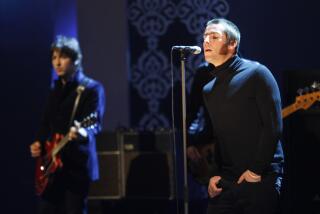Can Others Fly Like the Eagles? : Fans Want to See Reunion Tours--the Trick Is Getting Groups to Do Them
- Share via
Now that rock fans have plunked down more than $140 million over the last couple of years to see the Eagles reunited in concert, promoters are understandably drooling at the prospect of comebacks by other baby boomer favorites.
Their obvious first choice would be for the three surviving Beatles, flush from the success of their best-selling “Anthology 1” album, to get back together for a tour that promoters say would dwarf any other.
But that’s not likely because Paul McCartney, for one, has said he has no interest in a live reunion.
So Calendar put this question to a dozen of the nation’s leading promoters and concert industry observers: What reunion project not involving Paul, George and Ringo would top their holiday season wish list?
What about Eric Clapton re-forming Cream with Jack Bruce and Ginger Baker?
Or maybe John Fogerty burying the hatchet with his former mates and bringing back Creedence Clearwater Revival?
Perhaps Sting again pounding the beat with the Police?
All won support, but the consensus among promoters was that the most eagerly awaited reunion tour would team Bruce Springsteen with the E Street Band, the group he disbanded in 1989 after 15 years of service.
Runner-up: Led Zeppelin.
Also among the top 10, but far behind the top two: Genesis with original singer Peter Gabriel; the Police; Pink Floyd with founding member and primary songwriter Roger Waters; the Who; Crosby, Stills, Nash & Young; Simon & Garfunkel; Cream; and Creedence.
Springsteen’s current solo acoustic tour has filled small theaters and been applauded by critics on both coasts, but “there is a driving desire among the American people to see the E Street Band come back with Bruce,” says Jim Koplik, president of the concert division of Metropolitan Entertainment in Montclair, N.J.
Jack Boyle, chairman of the Cellar Door Companies in Fort Lauderdale, Fla., believes that a tour by Springsteen and the E Street Band would invigorate the music industry.
“It would stimulate so much,” he says. “That ‘Born in the U.S.A.’ tour [in 1984-85] caused so much excitement. The Stones don’t bring that kind of excitement. Nobody brings that kind of excitement. . . .
“I talk to a lot of people and a Springsteen tour with the E Street Band is what they ask for more than anything else.”
But Denver-based Barry Fey, who produced 13 shows on the Eagles’ current tour, also talks to a lot of fans--and he hears them clamoring for a British band.
And it’s not the Beatles.
“When I was on the road with the Eagles,” says Fey, president of the Fey Concert Co., “I would ask people, ‘Who do you want to see?’ And the answer always came back, ‘Zeppelin,’ ‘Zeppelin,’ ‘Zeppelin.’ They would be absolutely huge.”
Touring as a duo this year and playing only a sampling of their most familiar songs, Led Zeppelin leaders Robert Plant and Jimmy Page grossed almost $34 million, according to the concert industry trade magazine Pollstar.
But a Led Zeppelin tour (with or without third surviving member John Paul Jones), promoters say, could have earned three or four times as much, perhaps challenging the record gross of $121.2 million collected by the Rolling Stones during the North American portion of their “Voodoo Lounge” tour in 1994.
“They cost themselves $50-80 million,” Fey says. “They did a total here [in Denver] of 35,000 seats [in two shows]. Had they come as Led Zeppelin, they could have done more than 100,000.”
Those same kinds of numbers probably could be generated by a reunion of Waters and Pink Floyd or Gabriel and Genesis, but promoters aren’t holding their breath. Neither band is struggling without its founding members.
Pink Floyd grossed $103 million on its 1994 U.S. tour. “With or without Roger Waters, they’re huge,” Fey says. “You can’t do any more business than they did last time. I would be happy to take Pink Floyd in any form.”
Same with Genesis.
“But Peter Gabriel certainly has his own following,” says Gary Bongiovanni, editor and publisher of Pollstar, “and to have him on the same stage with Phil Collins and Mike Rutherford and all those people--that would be very big.”
Perhaps even more intriguing, some promoters say, would be a Police reunion.
“They broke up [in the mid-’80s] as they were becoming maybe the best band in the world,” says Andrew Hewitt, a partner in San Diego-based Bill Silva Presents.
And, as the Eagles proved, nostalgia-driven baby boomers don’t forget their favorites.
“When you saw the fan base at the Eagles shows, you said, ‘My God, these people really do go out,’ ” says Brian Murphy, president of L.A.-based Avalon Attractions. “But it’s really got to be something special.”
And nothing would be more special, industry observers say, than a Beatles reunion--even without the late John Lennon.
In Southern California, Murphy says, the Beatles could play a week at the Rose Bowl. “They’re light-years ahead of the No. 2 group,” he says. “Everybody would go see the Beatles.”
But that doesn’t mean they wouldn’t go see any number of other reunion acts.
How have these acts endured?
“You’ve got fans who are older trying to relive a period of their lives,” says Mitch Slater, president of Delsener/Slater Enterprises in New York.
“They want to recapture that feeling of a time when things were less hectic and they weren’t so responsible. And you have a radio format--classic rock--that has played these songs over and over, creating a whole new generation of fans. You’re dealing with wide, wide demographics, spanning generations.”
More to Read
The biggest entertainment stories
Get our big stories about Hollywood, film, television, music, arts, culture and more right in your inbox as soon as they publish.
You may occasionally receive promotional content from the Los Angeles Times.










